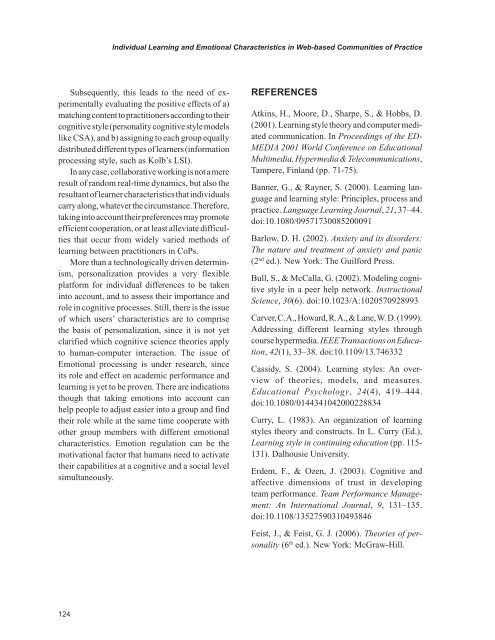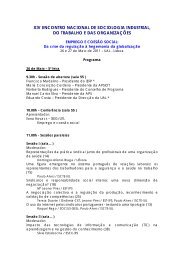Web-based Learning Solutions for Communities of Practice
Web-based Learning Solutions for Communities of Practice
Web-based Learning Solutions for Communities of Practice
You also want an ePaper? Increase the reach of your titles
YUMPU automatically turns print PDFs into web optimized ePapers that Google loves.
124<br />
Individual <strong>Learning</strong> and Emotional Characteristics in <strong>Web</strong>-<strong>based</strong> <strong>Communities</strong> <strong>of</strong> <strong>Practice</strong><br />
Subsequently, this leads to the need <strong>of</strong> experimentally<br />
evaluating the positive effects <strong>of</strong> a)<br />
matching content to practitioners according to their<br />
cognitive style (personality cognitive style models<br />
like CSA), and b) assigning to each group equally<br />
distributed different types <strong>of</strong> learners (in<strong>for</strong>mation<br />
processing style, such as Kolb’s LSI).<br />
In any case, collaborative working is not a mere<br />
result <strong>of</strong> random real-time dynamics, but also the<br />
resultant <strong>of</strong> learner characteristics that individuals<br />
carry along, whatever the circumstance. There<strong>for</strong>e,<br />
taking into account their preferences may promote<br />
efficient cooperation, or at least alleviate difficulties<br />
that occur from widely varied methods <strong>of</strong><br />
learning between practitioners in CoPs.<br />
More than a technologically driven determinism,<br />
personalization provides a very flexible<br />
plat<strong>for</strong>m <strong>for</strong> individual differences to be taken<br />
into account, and to assess their importance and<br />
role in cognitive processes. Still, there is the issue<br />
<strong>of</strong> which users’ characteristics are to comprise<br />
the basis <strong>of</strong> personalization, since it is not yet<br />
clarified which cognitive science theories apply<br />
to human-computer interaction. The issue <strong>of</strong><br />
Emotional processing is under research, since<br />
its role and effect on academic per<strong>for</strong>mance and<br />
learning is yet to be proven. There are indications<br />
though that taking emotions into account can<br />
help people to adjust easier into a group and find<br />
their role while at the same time cooperate with<br />
other group members with different emotional<br />
characteristics. Emotion regulation can be the<br />
motivational factor that humans need to activate<br />
their capabilities at a cognitive and a social level<br />
simultaneously.<br />
REFERENCES<br />
Atkins, H., Moore, D., Sharpe, S., & Hobbs, D.<br />
(2001). <strong>Learning</strong> style theory and computer mediated<br />
communication. In Proceedings <strong>of</strong> the ED-<br />
MEDIA 2001 World Conference on Educational<br />
Multimedia, Hypermedia & Telecommunications,<br />
Tampere, Finland (pp. 71-75).<br />
Banner, G., & Rayner, S. (2000). <strong>Learning</strong> language<br />
and learning style: Principles, process and<br />
practice. Language <strong>Learning</strong> Journal, 21, 37–44.<br />
doi:10.1080/09571730085200091<br />
Barlow, D. H. (2002). Anxiety and its disorders:<br />
The nature and treatment <strong>of</strong> anxiety and panic<br />
(2 nd ed.). New York: The Guil<strong>for</strong>d Press.<br />
Bull, S., & McCalla, G. (2002). Modeling cognitive<br />
style in a peer help network. Instructional<br />
Science, 30(6). doi:10.1023/A:1020570928993<br />
Carver, C. A., Howard, R. A., & Lane, W. D. (1999).<br />
Addressing different learning styles through<br />
course hypermedia. IEEE Transactions on Education,<br />
42(1), 33–38. doi:10.1109/13.746332<br />
Cassidy, S. (2004). <strong>Learning</strong> styles: An overview<br />
<strong>of</strong> theories, models, and measures.<br />
Educational Psychology, 24(4), 419–444.<br />
doi:10.1080/0144341042000228834<br />
Curry, L. (1983). An organization <strong>of</strong> learning<br />
styles theory and constructs. In L. Curry (Ed.),<br />
<strong>Learning</strong> style in continuing education (pp. 115-<br />
131). Dalhousie University.<br />
Erdem, F., & Ozen, J. (2003). Cognitive and<br />
affective dimensions <strong>of</strong> trust in developing<br />
team per<strong>for</strong>mance. Team Per<strong>for</strong>mance Management:<br />
An International Journal, 9, 131–135.<br />
doi:10.1108/13527590310493846<br />
Feist, J., & Feist, G. J. (2006). Theories <strong>of</strong> personality<br />
(6 th ed.). New York: McGraw-Hill.



